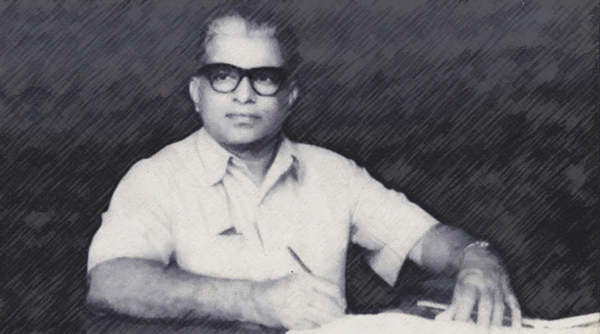
Dr B.P. Pillai was born near Trivandrum in the South of India in 1908. At the age of 17 he met his Guru, the revered yogi: Swami Sivananda Paramahamsa. The Swami was a simple, yet radical yogi. He taught equality and acceptance of all, regardless of caste, ethnicity, religion or gender. He led a simple life and travelled extensively teaching a simple method of prāṇāyāma meditation. Swamji was a Siddha Yogi and authored the book ‘Siddha Vedam’ and in 1921 founded the Siddha Samaj ashram in Kerala. Dr Pillai studied yoga regularly with the Swami for over twenty four years, during which time he also completed a masters degree in Sanskrit Language & Literature. He became a doctor of Sidhha and Ayurvedic medicine and was appointed chief examiner of Patañjali Yoga at Sagar University.
Dr Pillai developed his own unique, holistic approach to yoga and also to the practice of kriyās, which became a central component of his teaching. In 1979, he authored a book entitled ‘Yoga a Way of Life’ in which he gave detailed instructions on his system of kriyās. Dr Pillai taught his method to a western student named Duncan Hulin in the 1980s. Duncan initially spent three consecutive winters living with Dr Pillai and learnt the system in its entirety. At the behest of his teacher, Duncan returned to the UK and began teaching holistic yoga and kriyās in the the south west of England. He set up the Devon School of Yoga in 1989 which has since grown to become a thriving yoga school offering foundation, teacher training, yoga therapy and postgraduate yoga education. The author of this website James Russell has studied Yoga regularly with Duncan Hulin for the past twenty years and during a visit to India in 2009 visited the shrine of Dr Pillai's Mahāsamādhi - his final resting place.
Dr B.P. Pillai's holistic approach to the kriyās
The traditional śatkarma practices of haṭha yoga can be broadly divided into 3 categories:
- Vāri-sāra - cleaning with water
- Vāta-sāra - cleaning with air
- Agni-sāra - cleaning with fire
As an Ayurvedic therapist, Dr Pillai recognised the underlying intelligence of the human organism and its incredible potential for healing and transformation. He believed that some of the more extreme śatkarma practices were unnecessary and counterintuitive to that intelligence:
“The water method is rejected as unsuitable for the average person, so stomach, nasal and anal cleaning with water and cloth are excluded. They will not improve the intelligence of the organs and their beneficial functions are satisfactorily carried out by the other two cleansing process.” - (Dr Pillai, A way of Life, 1979)
He thus rejected the first category of Vāri-sāra practices, which includes practices such as stomach cleansing with water & cloth, vomiting, colonic irrigation and nasal irrigation. Instead Dr Pillai focused on the Vāta and Agni practices of air and fire - focusing primarily on breath and muscular expansions & contractions. In Dr Pillai's method, practitioners experience a complete yoga cleanse and all the resulting health benefits such as increased vitality and wellbeing, without having to resort to some of the more extreme practices of śatkarma.
One of the distinguishing features of Dr Pillai’s system is that it follows a 'krama’ - an ordered sequence of events. Dr Pillai organises the kriyās sequentially - and links a variety of practices together in such a way that they are no longer exercises performed in isolation - but balanced parts of an integrated holistic method. The kriyās are completed in a set order and begin at the top of the body, working down - clearing and stimulating the major systems and internal organs. Each part of the sequence is intimately connected with the next and when practised together as a whole, a powerful total cleanse is experienced. The kriyās have a profound effect on the physical body, as well as the mind and the subtle energetic body. The way in which these practices have been woven together is truly remarkable and are a testament to Dr Pillai’s wealth of practical expertise.